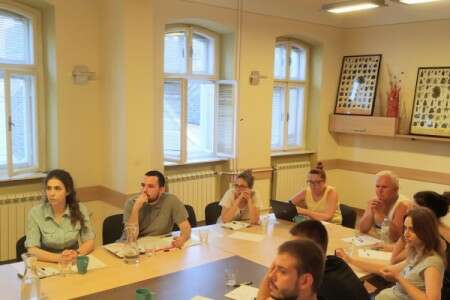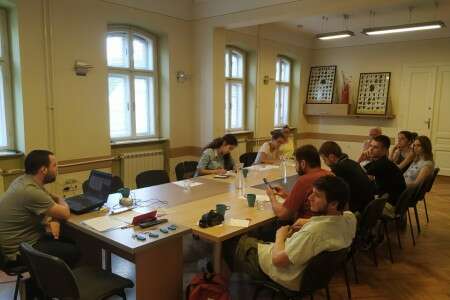Last weekend, the team of the Belgrade Open School in the program area Energy, Climate and Environment worked in Sremski Karlovci, in association with citizens and representatives of the Kolubara mining basin, discussing important issues such as air quality and just energy transition.
Active citizens - cleaner air
In order to create a local public advocacy plan for improving air quality in Belgrade, the Belgrade Open School organized training "Citizens for cleaner air" on 28 and 29 June 2019 at the Environmental Center "Radulovački".
Who are the main polluters of air? Which regulations govern the protection of air quality? Which institutions are responsible? Who is responsible for air quality? To whom and in what way should we address when we want to work on improving the quality of air? What are the legal obligations of the city and municipalities, and what are the obligations of the polluters? What measures are available to improve air quality? Who can be our ally in this business? Who will confront us? What is public advocacy and how is it implemented?
These are the questions that the lecturers, with the active participation of the participants, tried to answer during the two-day training.
After the introduction, Ognjan Pantić (BOS) gave a presentation on the results of civil air quality measurement. The participants also received official information on the existing state of air quality in the central and surrounding municipalities in Belgrade. It was emphasized that the data that citizens came to by independent measurement do not serve to mate with official data, but that their purpose is to spread awareness about this problem, to engage as many people as possible in the process of measuring air quality, and to influence in some way the competent institutions to provide accurate data and timely report on air quality.
Mirko Popović from the Renewables and Environmental Regulatory Institute (RERI), introduced the participants with the role that citizens have in the advocacy process. During the lecture, the public advocacy process was discussed as well as the necessary steps for its successful implementation. The participants came to the conclusion that, in addition to the necessary resources and developed support networks, patience is a key element for successfully achieving the goal of public advocacy.
On the second day of training, Mirjana Jovanović (BOS) presented an institutional framework that examines the issue of air quality in Serbia, which bodies are responsible for collecting and publishing data on air quality. Public air quality policy needs to be redefined in order to get more information about the state of air quality and to make the data more relevant.
In continuation of the training, the participants worked together to define the long-term and short-term goals of public advocacy, as well as to create a public advocacy plan. Working in groups, participants specified the time frame for future activities that should lead to transparent, reliable, publicly understandable, timely information on air quality.
Trade unions for just energy transition in Serbia
Together with workers in the Kolubara mining basin, we were talking about just energy transition. Firstly, the concept of a just energy transition was explained, what it implies and involves, along with the current energy image of Serbia, as well as relevant examples from the world. Predrag Momčilović, Ph.D. and the Faculty of Geography, presented a more detailed analysis, with the emphasized role of the trade unions in the process of energy transition. Upon completion of the lectures, potential recommendations for further action were also presented.
On the last day of the Seminar, the participants had the opportunity to talk to Samantha Smith, an expert on just energy transition. Samantha Smith is the director of the Just transition center, which brings together workers and their trade unions, businesses and government officials to ensure that workers have their place at the table when planning a just energy transition. Samantha Smith has shared her experiences that warn of potential hurdles. At the same time, she offered effective solutions and examples of successful practices that can be used to overcome challenges in the process of just energy transition in Serbia.
Energy transition is inevitability and we need to be prepared for its appearance in order to make the consequences as light as possible for all of us.
The training was organized within the project "Local Actors for Clean Energy and Air" (LA4CEA), which Belgrade Open School conducts with the support of the European Climate Foundation (ECF).
In the earlier phases of the project, citizens from Lazarevac and central Belgrade municipalities installed their air quality measuring devices in their homes in order to monitor the concentration of dangerous particles and to receive real-time data on air condition in their environment. On that occasion, the citizens were participants in the seminar where they received the necessary knowledge about the basic parameters of air quality, methods of measurement, data sources and relevant regulations and institutions that are responsible for air quality, as well as instructions for proper installation and use of the appliance.
Photo source: Belgrade Open School


